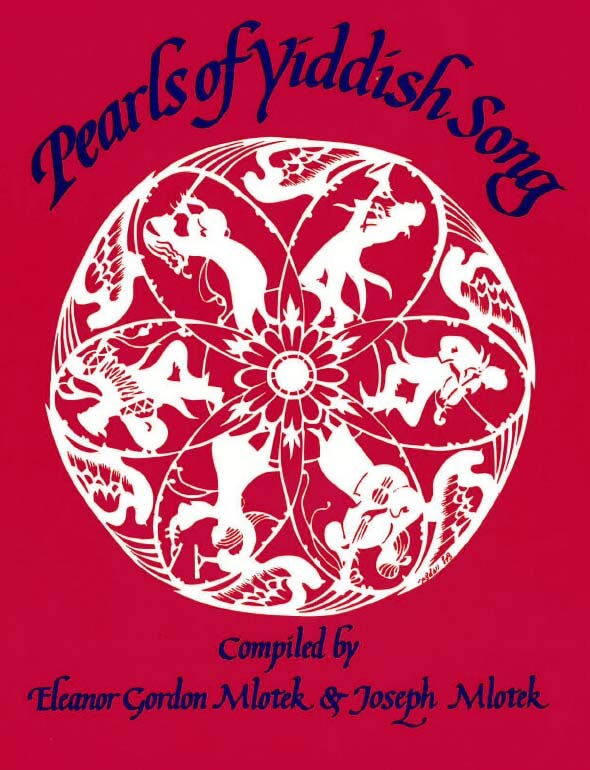Part of an allegoric song of the widowed Mother Zion seeing her scattered children return home. Written in 1882 by the famous badkhn [wedding entertainer] and folk bard Eliakum Zunser (1836-1913) as a tribute to the BILU movement — acronym for the Biblical motto from Isaiah 2: “Beys yakov likhu unelkha” (House of Jacob, come and let us go). Students from the University of Kharkov set out for Palestine via Constantinople for the purpose of establishing agricultural settlements in Palestine. On the way, they stopped for three days in Minsk to pay tribute to Zunser, the singer of Zion. It was then that Zunser composed the song and selected the motto from Isaiah: “Lift up thine eyes round about, and behold: all these gather themselves together and come to thee.”

What do I see through the window panes?
Flying like doves are my Joseph, my Benjamin, and then they knock on my door!
Ah, heaven, God, how wondrous!
I see my children, my beloved ones, my faithful ones are coming to me!
So many years have passed. I thought I was lost, a desolate widow, alone at my table. . .
How has it been for you since you were captured?
How are Judah and Ephraim?
Give me greetings!
Come here, old times.
I’ve become young.
I cast aside my sorrow.
Give me my silk dress.
My house is full again.
My heart lifts, my limbs.
All my children come with joy.
My tears flow with happiness.
Let me caress you, kiss you.
Rest your weary bones in my house, my beloved guests.
I will give you all the pleasures.
You will not sit at a stranger’s table, you’ll board only with your mother.
These young people will be blessed by the world.
They leave their homes, possessions, luxury, happiness.
Learned people, highly cultured.
They want to sacrifice themselves for their people.
They’ve sworn to hurl all the stones that lie in the way, to suffer all hardship like in Moses’ times.
And their names will be remembered like Ezra’s till the end of days.
Vos ze ikh durkh di shoybn?
Es flien on vi toybn
Mayn Yoysef, mayn Benyomen
Klapn in mayn tir!
Akh himl, got, di vinder!
Ikh ze dokh mayne kinder,
Di libste, di getrayste
Kumen on tsu mir!
Avek azoy fil yorn,
Gemeynt ikh bin farlorn,
An almone a farviste —
Leydik bay mayn tish. . .
Mit aykh vi iz gegangen,
Tsayt men hot aykh gefangen?
Vos makht Yehude un Efrayim?
Git mir a gerus!
Aher kumt, yene yorn!
Ikh bin yung gevorn,
Ikh varf arop mayn troyer,
Aher — mayn zaydn kleyd!
Ful vert mayn hoyz vider,
Es heybt dos harts, di glider,
Fil fun mayne kinder
Forn on mit freyd!
Fun simkhe trern flisn,
Lozt mikh haldzn, kishn,
Rut aykh oys bay mir di beyner,
Mayne hertsnsgest!
Ir vet bay mir krign
Ale fargenign,
Ir vet nit visn fremde tishn,
Nor di muters kest!
Ot dize yunge mentshn
Vet di velt zey bentshn,
Farlozn hayzer, giter,
Glants un glik un pral!
Mentshn geshtudirte,
Hoykh tsivilizirte
Viln zayn korbones
Far dem gantsn klal!. . .
Zey hobn zikh bashlosn
Oyf alerley fardrosn,
Nor optsuvarfn ale shteyner
Vos lign oyfn veg;
Tsu laydn shverikaytn
Vi in Moyshes tsaytn,
Un zeyer nomen blaybt mit Ezras
Biz di letste teg!
װאָס זע איך דורך די שױבן?
עם פֿליִען אָן װי טױבן,
מײַן יוסף, מײַן בנימין
קלאַפּן אין מײַן טיר!
אַך הימל, גאָט, די װוּנדער!
איך זע דאָך מײַנע קינדער,
די ליבסטע, די געטרײַסטע
קומען אָן צו מיר!
אַװעק אַזױ פֿיל יאָרן,
געמײנט איך בין פֿאַרלאָרן,
אַן אַלמנה אַ פֿאַרװיסטע —
לײדיק בײַ מײַן טיש. . .
מיט אײַך װי איז געגאַנגען,
צײַט מען האָט אײַך געפֿאַנגען?
װאָס מאַכט יהודה און אפֿרים?
גיט מיר אַ גערוס!
אַהער קומט, יענע יאָרן!
איך בין יונג געװאָרן,
איך װאַרף אַראָפּ מײַן טרױער,
אַהער — מײַן זײַדן קלײד!
פֿול װערט מײַן הױז װידער,
עס הײבט דאָס האַרץ, די גלידער,
פֿיל פֿון מײַנע קינדער
פֿאָרן אָן מיט פֿרײד!
פֿון שׂמחה טרערן פֿליסן,
לאָזט מיך האַלדזן, קושן,
רוט אײַך אױס בײַ מיר די בײנער,
מײַנע הערצנסגעסט!
איר װעט בײַ מיר קריגן
אַלע פֿאַרגעניגן,
איר װעט ניט װיסן פֿרעמדע טישן,
נאָר די מוטערס קעסט!
אָט דיזע יונגע מענטשן
װעט די װעלט זײ בענטשן
פֿאַרלאָזן הײַזער, גיטער,
גלאַנץ און גליק און פּראַל!
מענטשן געשטודירטע,
הױך ציװיליזירטע
װילן זײַן קרבנות
פֿאַר דעם גאַנצן כּלל!. . .
זײ האָבן זיך באַשלאָסן
אױף אַלערלײ פֿאַרדראָסן,
נאָר אָפּצוּװאַרפֿן אַלע שטײנער
װאָס ליגן אױפֿן װעג;
צו לײַדן שװעריקײטן
װי אין משהס צײַטן,
און זײער נאָמען בלײַבט מיט עזראס
ביז די לעצטע טעג!
Song Title: Shives Tsion

First published in 1988 as Pearls of Yiddish Song: Favorite Folk, Art and Theatre Songs, this anthology contains 115 songs. Some material had never been published, while others, included in rare song collections or sheet music, were largely inaccessible. The songs presented reflect Jewish life in Eastern Europe and the United States and depict childhood, love, family celebrations, poverty, work and struggle. There are also songs from the Hasidic and Maskilic movements, songs of Zion and of America, as well as songs from the Yiddish theater.
The title of this anthology derives from the weekly two-page feature column “Pearls of Yiddish Poetry,” which the compilers Yosl and Chana Mlotek initiated in 1970 in the Yiddish newspaper Der Forvertz (the Yiddish Daily Forward). Hundreds of readers from around the world — including authors, composers, singers, actors — became co-participants in this collective folk project and recalled melodies, lines, fragments, stanzas and their variants of songs, poems, and plays which they had heard in their youth. At first, readers sent in only written material. Later, they also taped songs on cassettes, many of whose melodies had, until then, never been recorded. They also identified and supplied missing information regarding lyricists, poets, and composers and described the circumstances surrounding the songs’ origins, their dissemination, diffusion and impact.